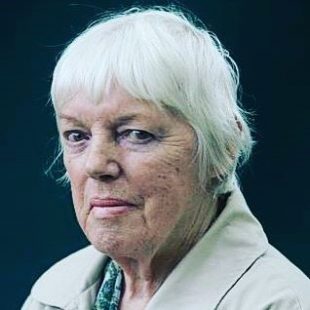Agnes Owens 1926 – 2014
Words by Giovanna MacKenna

AGNES OWENS had lived many lives before she began to write at the age of 51. She had known extreme hardship, worked low-paid jobs, married twice, mothered seven children and came to writing with a guile-less prose which stripped bare the experiences of Scotland’s working classes. Discovered by Scots writing royalty Liz Lochead, Alasdair Gray and James Kelman, her work never really did find the recognition it deserved, with Gray bemoaning her as “the most unfairly neglected of all living Scottish authors”.
Agnes was born in 1926 in Milngavie. Her father lost a leg during the First World War and was unemployed for years after returning home, eventually finding work in the local paper mill in 1936. Agnes hoped to follow him there, however, her mother insisted she be ‘educated’ and so she learned to type and take shorthand, but an early marriage to an alcoholic solider saw her mother’s aspirations curtailed.
In 1946, with £11 in their pockets, Agnes, her husband Sam and their infant daughter could find little to ease their lives in the central belt. A chronic housing shortage pushed them to follow the promise of work and lodgings in the North of Scotland. The family finally arrived in the remote village of Scoraig, near Ullapool, but found none of their hopes realised and were forced to shelter in an outhouse. There then followed more than a year of itinerant living, walking from town to town seeking work and sleeping in a two-man tent or in derelict buildings. During this time Agnes gave birth to another child and, finally, the couple returned home where they successfully secured one of the council’s pre-fabricated houses.
“the most unfairly neglected of all living Scottish authors”
Agnes then had two more children and found work as a factory worker and a typist. Sam’s drinking often saw him hospitalised, she said: “That was my happiest time, going to visit him. It meant I didn’t have to put up with him back home.” Sam died at the age of 43 and Agnes went on to marry again, to a labourer called Patrick, and had three more children. The family continued to live as best they could with her sons following their father’s profession and Agnes finding work as a cleaner.
In an effort to vary her life – or to get “a night out,” as she put it – Agnes joined a local writing group where she shared the poetry she often wrote at home. There she was taught by Liz Lochhead who, along with James Kelman and Alasdair Gray, was a Glasgow University tutor charged with manning their outreach projects. Agnes gave her comic and deeply unsettling tale, Arabella, to Lochhead, who showed it to Gray and Kelman. The writers recognised one of their own and set about mentoring and encouraging Agnes.
In 1984 her first novel, Gentlemen of the West, was published. This collection of stories centred on young brick-layer Mac, who Agnes based on one of her sons. Finding a willing publisher wasn’t easy, even with the support of her literary friends. Her writing was unsettling, this was not a world of ‘poor folk’ to be pitied but a frank, unflinching portrayal of hard lives, made compulsively readable by the quiet, prickling humour which bound her stories. At one stage it seemed Agnes’ only hope was to have the book endorsed by the hugely popular Billy Connolly. She sent the comedian her manuscript, and had no reply. Sometime later she was employed to clean his house – and managed to retrieve her script.
By 1985 things seemed to be going well for Agnes. She co-authored Lean Tales with Kelman and Gray, contributing nine stories to the book and receiving critical acclaim, with the Irish Times asking why they had heard so little of her as “she is the best of them”. This period of positivity came to an abrupt end with the murder of her youngest son, 19-year-old Patrick, in 1987. Patrick was stabbed to death by people he knew outside the family home. One man was convicted for his killing, and served two years. Agnes stopped writing and later spoke of the effect the murder had on her, “It took all your time to get through the day,” she said. “You weren’t ill, no, and you never became ill, but you would have loved to have died.”
Eventually Agnes began to write again and her novel A Working Mother, about the wife of an alcoholic, was published in 1994. Next came the short story collection People Like That, in 1996, which included the brief but astonishing biographical tale Marching to the Highlands and into the Unknown. Then, in 1998, her novel For The Love of Willie, a creepingly tragic tale, was shortlisted for the Stakis Scottish Writer of the Year award. Agnes described the book as, “nasty, but funny.”
Despite being undervalued by the establishment – which Gray suggested was because she was “not in the celebrity class” – Agnes continued to write into her eighties. Her Complete Short Stories were published in 2008. She was particularly pleased, here at last was a ‘proper book’ unlike the slim volumes that had gone before it. “It’s what I’ve been striving for,” she joked, “a thick book!” Her novels and short stories offer a visit into the lives of the working classes. They present extreme difficulties and traumatic happenings in a prose which provide the reader with a laser-clear view of those lives – without seeming to care if we look or not. Agnes’ power comes from the honesty of her language and stories. These are written with enormous skill and restraint, and are more affecting for it.
Agnes died in 2014, age 88, her death provoking further passion for her searing prose, and even greater outrage that we had not treasured her more while she lived. Agnes is survived by her husband Patrick and her children Ann, Bill, John, Catherine and Margaret. Her daughter Irene died in September 2013 and her son Patrick was killed in 1987.
Online Exhibition

Explore Agnes’ life through objects from the GWL Museum and Archive collections in this online exhibition.
Open the Door 2019
Join Liz Lochhead as she delivers an original creative response to the work of Agnes Owens on Friday 17th May at our Friday Evening Herland as part of Open the Door.
Sources:
Vale of Leven website:
http://www.valeofleven.org.uk/famousfolk/agnesowens.html
The Herald: James Kelman appreciation
https://www.heraldscotland.com/opinion/13186626.agnes-owens/
The Herald: A Heart that Stays at Home by Lesley Duncan
https://www.heraldscotland.com/news/12696338.a-heart-that-stays-at-home/
Scotsman Obituary by Chitra Ramaswamy
https://www.scotsman.com/news/obituaries/obituary-agnes-owens-author-1-3583384
Scotsman Interview: The Fat with the Lean by
https://www.scotsman.com/lifestyle/culture/books/the-fat-with-the-lean-agnes-owens-interview-1-1431764
Thesis: After Scotland’s literary “golden age”: Locating Agnes Owens by Rupert Alexander Pirie-Hunter
https://researcharchive.vuw.ac.nz/xmlui/bitstream/handle/10063/4578/thesis.pdf?sequence=2
